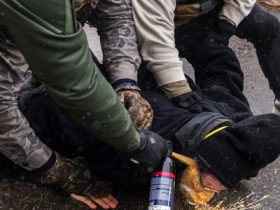The House is getting close to voting on its version of the 2026 National Defense Authorization Act, several lawmakers said Tuesday, six weeks after the fiscal year began. “It should be on the floor the beginning of the second week of December,” Rep. Rob Wittman, R-Va., told one of your D Brief-ers at our Acquisition Summit on Tuesday. Meanwhile, House Armed Services Committee chair Rep. Mike Rogers, R-Ala., told Roll Call to expect a vote the week after Thanksgiving.
Wittman: “I think we are just about finished with all the issues involving HASC and SASC. The other issues remaining to be resolved are issues having to do with other committee jurisdictions, and those mostly are relegated to the Senate bill, so they’re trying to work through those particular issues. I think that those will hopefully be done by the end of the week, and then the bill will be in its final form.”
Meanwhile: the SASC chair has canceled confirmation votes for Alexander Velez-Green, tapped to be the Pentagon’s deputy policy chief, and Austin Dahmer, the nominee to be assistant defense secretary for strategy, plans and capabilities. Politico: “The rare move by Armed Services Chair Roger Wicker (R-Miss.) to delay the votes is a hard flex from traditional Republicans in the committee’s public fight with the nominees’ boss, Pentagon policy chief Elbridge Colby. Republican defense hawks have slammed Colby for icing Congress out of key strategic decisions.”
Conflicting accounts: The pause might also reflect Velez-Green’s and Dahmer’s performances during their confirmation hearings earlier this month, when they gave differing versions of how the U.S. came to pause arms shipments to Ukraine earlier this year.
Update: Following a judge’s order sending 200 Oregon National Guard troops home, those soldiers now must travel to Fort Hood in Texas just to “demobilize,” the Oregonian reported Tuesday. The process involves “medical and mental health screenings and administrative duties like dealing with their pay,” a Guard spokesman told the newspaper.
What’s going on: Because they were federalized by President Trump, those soldiers have no formal place in Oregon to demobilize, “so troops will travel out of state like they would when returning from an international deployment,” and “The federal government picks up that tab,” the spokesman explained.
Can quantum sensing turn magnetic navigation into a replacement for GPS? Well, not yet—but a new Pentagon contract indicates that one company might be on the right track to overcome one of the main barriers: how to know whether your quantum nav device is working. Defense One’s Patrick Tucker explains, here.
Additional reading:
Welcome to this Wednesday edition of The D Brief, a newsletter dedicated to developments affecting the future of U.S. national security, brought to you by Ben Watson and Bradley Peniston. It’s more important than ever to stay informed, so thank you for reading. Share your tips and feedback here. And if you’re not already subscribed, you can do that here. On this day in 1863, President Abraham Lincoln delivered the Gettysburg Address.
Trump 2.0
The U.S. has designated more terrorist groups this calendar year than it did in the last 10 years combined, Patty Nieberg and Jeff Schogol of Task & Purpose reported Tuesday as the White House escalates its war against drug cartels.
From 2014 to 2024, 18 groups earned the U.S. designation. Just since January, 19 groups have been added, including eight drug cartels.
Why bring it up: “[P]olitically, this administration has used these designations to pave the way for military action,” said Brian Finucane, a former State Department lawyer.
But designating cartels as terrorists marks a significant break from precedent in that “[Drug cartels are] trying to sell Americans an illegal product, but they’re not targeting Americans with violence. They’re not crashing airplanes into buildings and therefore using the tools of counterterrorism are completely inappropriate,” Finacune said. “Obviously, drug overdoses, drug abuse in this country is a terrible problem, but it’s a public health problem. It’s not a military problem,” he added. Continue reading, here.
Analysis: Trump says Venezuela’s Nicolas Maduro leads a drug cartel called Cartel de los Soles. But “Cartel de los Soles” is not an actual group; it’s “a figure of speech in Venezuela, dating back to the 1990s, for Venezuelan military officials corrupted by drug money,” Charlie Savage of the New York Times reports, citing regional specialists, think tankers, and former Drug Enforcement Administration officials.
Related reading: “Can Venezuela Count on Any Allies to Help if the U.S. Attacks?” the Times reported separately on Tuesday.
Developing: A U.S. contractor is reportedly recruiting LinkedIn users to “physically track immigrants for ICE” at a cost of about $300 each, 404 Media reported Tuesday.
And in Minnesota, an ICE agent was among 16 men arrested in a sex trafficking sting, CBS News reported Tuesday. “When he was arrested, he said, ‘I’m ICE, boys,’” Bloomington Police Chief Booker Hodges said at a press conference Tuesday. “Well, unfortunately for him, we locked him up.”
As ICE enforcement expands from Charlotte to other cities in North Carolina, New Orleans and New York may be next, CNN and The Hill reported Wednesday morning.
Additional reading:
Ukraine
After two failed summits with Russia’s leader, the Trump administration is reportedly drafting a new, “28-point plan” to end Vladimir Putin’s Ukraine invasion, Axios reported late Tuesday. “The plan’s 28 points fall into four general buckets, sources tell Axios: peace in Ukraine, security guarantees, security in Europe, and future U.S. relations with Russia and Ukraine. It’s unclear how the plan approaches contentious issues such as territorial control in eastern Ukraine—where Russian forces have been inching forward, but still control far less land than the Kremlin has demanded.”
The effort is being led by Trump envoy Steve Witkoff, who discussed it extensively with Russian envoy Kirill Dmitriev, who runs Russia’s sovereign wealth fund, visited Miami on Oct. 24-26, a U.S. official said. “Dmitriev expressed optimism about the deal’s chances of success because, unlike past efforts, ‘we feel the Russian position is really being heard’,” Axios wrote, here.
U.S. Army leaders in Kyiv: As part of the effort, Army Secretary Dan Driscoll and Chief of Staff Gen. Randy George are in Ukraine this morning, the Wall Street Journal first reported. They are “on a fact finding mission to meet with Ukrainian officials and discuss efforts to end the war,” Army Spokesperson Col. Dave Butler told CNN in a statement.
European defense stocks fell 3% on the news, Reuters reported on Wednesday afternoon Berlin time.
Another likely Russian drone entered NATO airspace, this time over Romania, ABC News reports.
That took place during overnight Russian attacks on Ukraine that killed at least 25 people and wounded more than 70 others
Developing: The U.S. is on the verge of selling Ukraine an upgrade package (not new launchers) for Patriot air defense systems totalling about $105 million. The Pentagon’s Defense Security Cooperation Agency has a few more details, here.
And lastly, in commentary: Don’t leave Lithuania, Luke Coffey of the Hudson Institute argues, writing Tuesday for Defense One. The Pentagon’s Global Posture Review is months behind schedule, but several senior officials are signaling their desire to reduce U.S. troop deployments around the globe. Coffey argues that the Baltic country is too geographically vulnerable and strategically important to reduce the rotational deployment of U.S. forces there.
Read the full article here








Leave a Reply